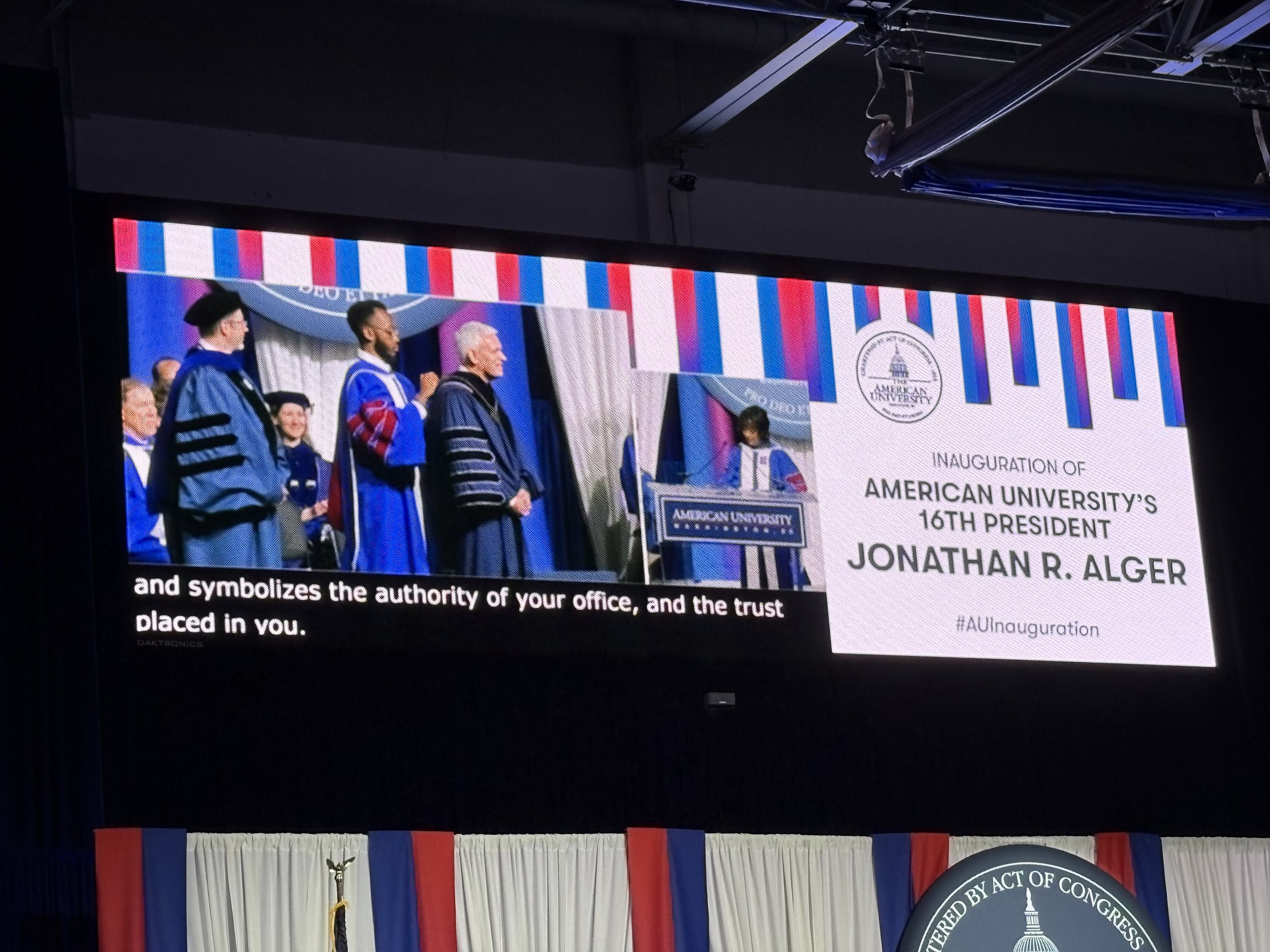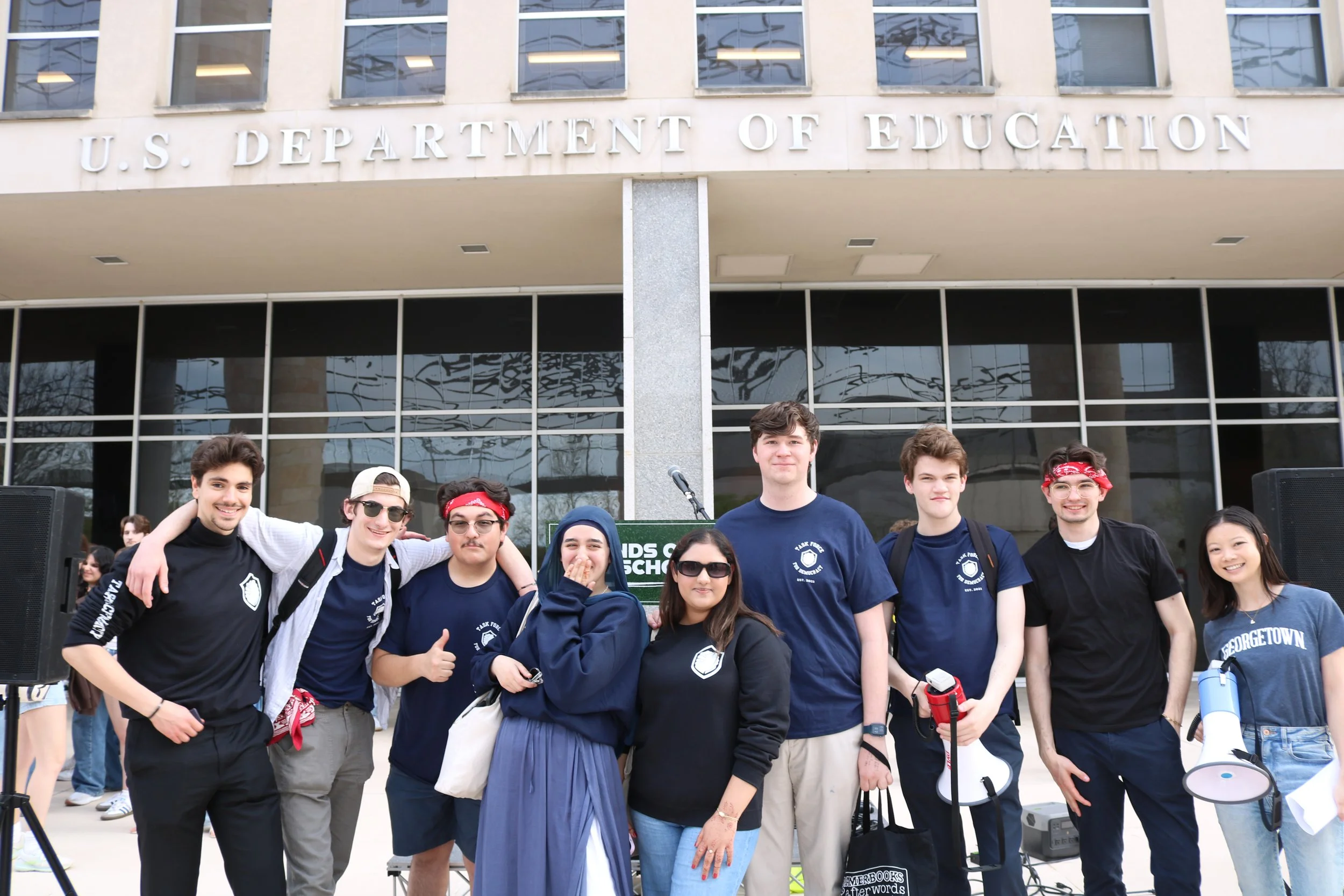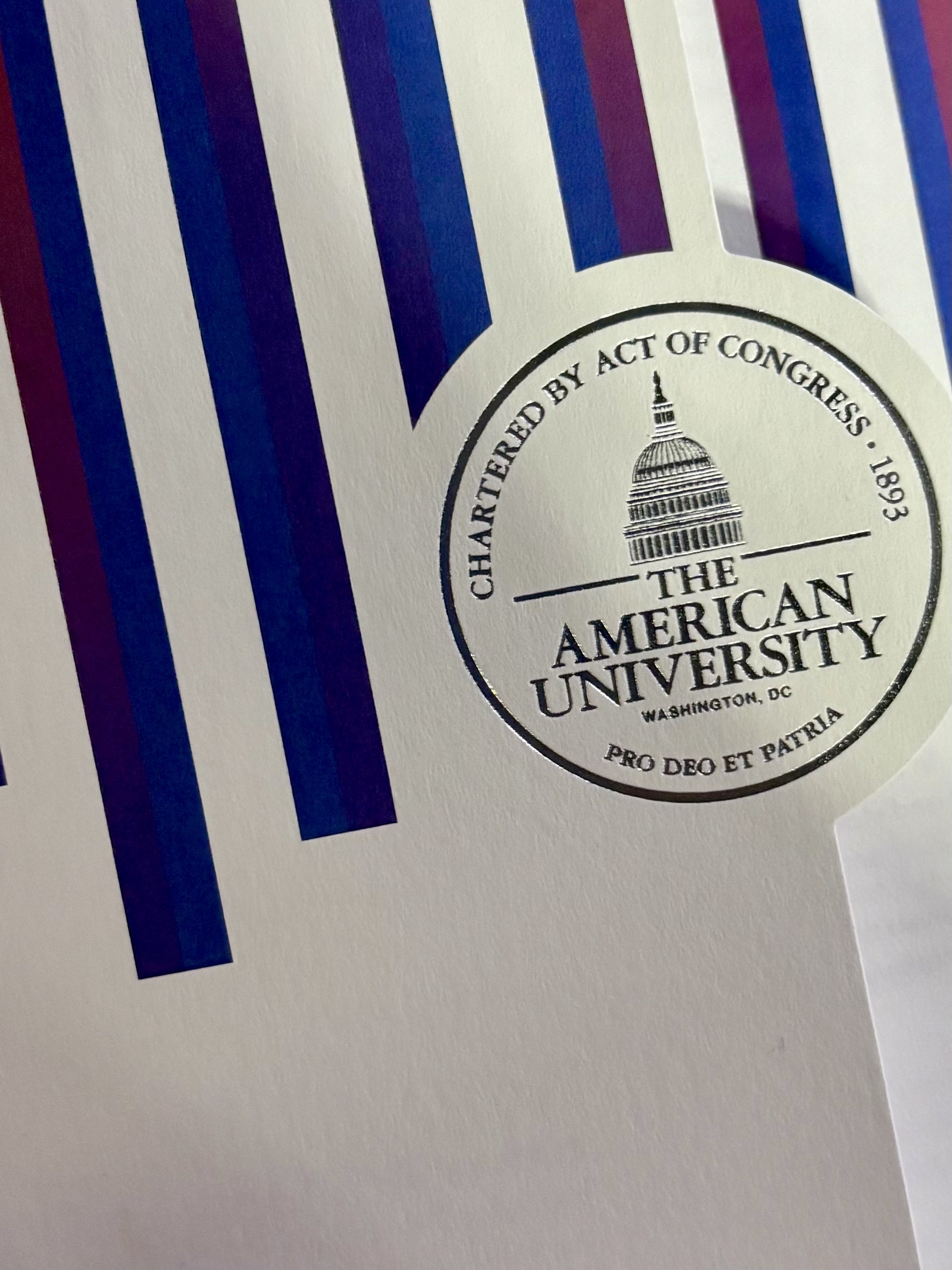Challenge Not Accepted: AU Students Speak On Alger’s Responses (and Lack Thereof)
Editing by Jacob Saucier, Callie Whicker, and Sophia Romano
Nearly a year into his presidency at American University, Jonathan Alger finds himself guiding AU through a challenging time for higher education in the U.S. His leadership style, priorities, and public responses to national developments have sparked widespread outrage and criticism.
The Inauguration of Jonathan Alger (Jhonny Lopez-Lopez / The Rival)
Students Grow Increasingly Concerned About Perceived Lack of Response to Federal Policies
Many politically active students say that he has not provided clear, actionable steps or guidance to AU students, staff, and faculty. While university presidents cannot directly override federal immigration enforcement, students believe AU’s silence sends a powerful message amid the intensifying crackdown on immigration and political activism.
“His lack of response, especially in the context of Trump’s administration actions to suppress student voices, is concerning and inadequate,” said Mariam Malik, an SPA junior. “I think the [Alger] administration keeps underperforming in protecting students, and it’s very scary that it’s not a priority for them.”
As of late April, President Alger most recently acknowledged federal policy in emails sent on March 26th and April 22nd, which informed students that AU is “closely monitoring” federal policies and will continue to make decisions based on the university’s core mission and values on inclusivity and higher education. The President also reiterated the University’s commitment to defending its core principles and values such as ‘‘freedom of thought’’ and empowering individuals of all backgrounds.
“I think any administration response needs to be stronger than an email statement to counter attacks from the Trump Administration,” said Rohin Ghosh, a senior AU student and YDSA member. “I think the first step of that action is making sure the groups most affected are actually driving the conversation around what happens.”
At least 1,500 international students across U.S. institutions have had their student visas revoked in the last few weeks. Provost Vicky Wilkins recently told AWOL that an unspecified number of AU students have had their visa statuses impacted.
ICE had also been deleting international students from the Student and Exchange Visitor Information System (SEVIS) database, which lists internationals who have a legal right to study in the US, before a wave of lawsuits from impacted students generated a wall of emergency orders blocking the changes. The students say they were given little to no reason that their right to study had been revoked, with some receiving emails citing minor traffic infractions or no clear explanation at all. The Trump administration backpedaled on April 25th and announced that it would restore the deleted SEVIS records for students whose visas had not been revoked, but stressed that this would be temporary and that they had already begun work on a new system for reviewing and terminating SEVIS records.
Students say the lack of a tangible plan to protect their rights has only deepened uncertainty for members of the university’s international community who rely on green cards, DACA status, or visas — especially as it remains unclear whether recent protections will be permanent or if further attempts to revoke them will follow. “[Alger] should be focused on providing more mental health resources to manage the high emotions that a lot of affected students could have right now,” said Will Shister, a CAS junior.
Others have begun to question President Alger’s genuine commitment to diversity, equity, and inclusion. American University has long promoted a policy of “inclusive excellence,” a frame that some students argue softens the language around race and diversity. On April 10th, Dr. Nkenge Friday, Vice President of Inclusive Excellence, sent an email reaffirming the university’s ongoing efforts to revise and strengthen its inclusion strategies in response to evolving federal policies, writing, “We will not back away from our dedication to inclusive excellence because we know it enhances the learning environment for everyone.”
“I think when the President talks about inclusive excellence, we have to ensure we encapsulate all diverse voices in the conversation, which the president hasn’t in the current lines of communication,” said Arusa Islam, senior and outgoing AUSG President.
While the students we talked to acknowledge that AU receives significant federal funding, they believe there are actions Alger could take without risking it. “Alger came from a university that didn’t have to take strong political stances, but AU is not that kind of place,” said Samuel Williams, a SPA sophomore. “AU needs clearer communication and more mental health resources for students affected by Trump’s policies.”
Student-Led Coalitions and Protests Emerge in Response to Alger’s Silence
AU protestors walking towards the President’s House on April 17th (Jhonny Lopez-Lopez / The Rival)
Various AU campus organizations are uniting to demand more from President Alger and protest federal policy changes.
On April 15th, Latinos en Acción and other groups held a community circle to discuss the university’s immigration policies and explore ways university leadership can better support students. They welcome all AU community members and other student organizations to future meetings.
Student-led protesting has also picked up. Sunrise Movement AU and the AU Association of American University Professors led joint-organization quad protests on April 17th and 18th placing signs on the President’s House door, demanding more decisive action, and emphasizing that, “the time for strong university leadership is now.”
Sunrise AU and AAUP Protest leadership (Jhonny Lopez-Lopez / The Rival)
Other student-led groups, such as Task Force for Democracy, have joined with other D.C.-area organizations to protest Trump administration policies. Their efforts included a demonstration outside the Department of Education on April 4th and rallying students for the nationwide “Hands Off” protest on the National Mall the following day.
“I wish he would directly say to marginalized students, ‘We are here for you,’” said Kaden Ouimet, AU student and President of Task Force For Democracy. “Instead, he is preemptively complying with Trump and gutting the School of Education along with critical race and gender programs.”
AU students rally outside the Department of Education (Jhonny Lopez-Lopez / The Rival)
At the April 4th protest, former U.S. Representative Jamaal Bowman commented on AU students’ historical political activism and tenacity, saying, “AU students are known to be outspoken and determined. That is definitely the kind of energy we need right now.”
Coalitions and coordination between student movements are beginning to emerge. Commenting on student unity, Selene Malench, former President and current member of the Asian American Student Union, said, “It is important for us to bond together with other affinity organizations, especially about issues that affect all of us. The way forward is to work together to form a broader affinity coalition.”
Protestors on the Quad on April 24th in support of arrested AU student (Jhonny Lopez-Lopez / The Rival)
On April 23rd, YDSA, AUSG, and the AU Graduate Student Workers’ Union united under the slogan “Hands Off Our Students,” protesting the arrest of Elaf Hasan, an AU graduate student who was arrested for displaying a Palestinian flag during President Alger’s inauguration in March. Protesters were frustrated with Alger and university leadership over their response to the incident and voiced broader concerns about free speech on campus.
Students Worry Alger’s Leadership Will Mirror Burwell’s
President Burwell frequently drew criticism from students for her administration’s handling of campus speech and activism. One notable incident involved AUPD monitoring peaceful student protests while carrying zip ties, which some students saw as an attempt at intimidation by her university officials.
Acil Mecham, an SPA senior, spoke to that belief, saying, “Burwell did a lot to undermine students’ trust, I think [Alger] has a big hurdle to overcome and that’s why I want him to be as transparent as possible on his handling of student speech.”
Signs on the Quad on April 24th in support of the arrested AU student (Jhonny Lopez-Lopez / The Rival)
Some note that many of Burwell’s officials still reside in Alger’s cabinet. “I don’t think the leadership at AU has really changed much under President Alger so far,” said Asher Heinsten, an SPA sophomore. “Some people in the president’s cabinet are individuals who made significant decisions against free speech last year or were silent about the sexual assault incidents on campus.”
For a few students such as Matthew Pasternak, a sophomore, Alger’s leadership seems promising. “He’s on track to increase our prestige in several college rankings,” Pasternak said. “Sure, some concerns are valid, like the need for more transparency, but I’m confident that he’ll address them."
Gracemary Allen, a graduate student and YDSA member, similarly hopes for the future of AU under Alger, “I know at JMU he had a history of promoting civil dialogue events and I hope he will continue to do so with subjects considered more contentious at AU.”
Students Urge Each Other to Rise Up
Many students are calling for more engagement and solidarity on campus. While some have consistently shown up—at walkouts, organizing meetings, and in conversations—they wish to see more join them. For many, this moment demands more than silence; it demands presence.
“If you have the privilege to come out, you have to show up,” pleaded Kasey Bernat, an SIS sophomore. “If they’re coming after the most marginalized, they’ll certainly come after everyone else.”
Salvatore Cottone, AUSG’s Chief Financial Officer, acknowledged that many students may feel burnt out by the relentless news cycle and seemingly endless developments. Still, he emphasized the importance of perseverance, “We can’t let our tiredness and our lack of motivation take over, because what then will we have to fight for in the future?”
“This period of time will be in history textbooks,” said Oscar Gillette, an SPA sophomore. “Your grandchildren will ask you, ‘What did you do during this time?’ You’ll have to live with what you did — or didn’t do — to resist and speak up for others for the rest of your life.”
Author’s Perspective: If You Ask Us to Dream, Lead Like It.
The inauguration event program (Jhonny Lopez-Lopez / The Rival)
I don’t like speeches all too much. Many are too long, some are just outright boring, but when I attended President Alger’s inauguration his speech left me with much to think about. Although Alger tugged on my heartstrings when he mentioned the lingering memory of Wonk Cat, I was left with the same frustration that many of the students I interviewed had.
“AU is at the right place, at the right time,” Alger said, “One of the most important things is to be there for one another. Our community must stand together and stand up.” In my opinion, Alger made his most direct comment critiquing Trump administration policies when he remarked, “Inclusion and excellence are not competing concepts. We will not back away from the fundamental commitment of inclusion in education.”
Near the end of his speech, Alger said, “I encourage AU to dream big.” But as I reflect on the fear and frustration many students are feeling, I wonder: is Alger’s current approach what he envisions when he dreams of AU’s future?
In April alone, the AU community honored the passing of a beloved TDR worker, grappled with reports of AU student visa revocations, gathered for a student-led circle on immigration fears, and protested outside the president’s house and on the quad.
However, in all of these events, there was a significant absence: there was little to no acknowledgment, support, or visible presence from the Alger administration. At least for me, that initial silence—that absence—speaks volumes more than whatever university officials can say in an email.
Are we dreaming big enough when we demand more from his administration?
President Alger, if you’re encouraging the community to dream big, you should be the first to dream about a university where everyone is seen. Dream about a campus where workers aren’t forgotten. Dream about a campus where students aren’t left waiting for more than an email. Dream about a campus where leadership doesn’t stay silent when voices speak up with grief or frustration.
Start by showing up, especially when it matters most. If Challenge Accepted is more than a slogan, now’s the time to prove it.
We’re still here. We’re still watching. We’re scared, sure–but we’re still hopeful that you’ll do more.







